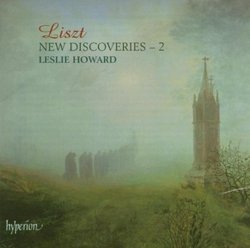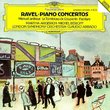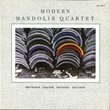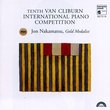| All Artists: Franz Liszt, Leslie Howard Title: Liszt: New Discoveries, Vol. 2 Members Wishing: 0 Total Copies: 0 Label: Hyperion UK Release Date: 6/8/2004 Album Type: Import Genre: Classical Styles: Chamber Music, Forms & Genres, Concertos, Historical Periods, Classical (c.1770-1830), Instruments, Keyboard Number of Discs: 1 SwapaCD Credits: 1 UPC: 034571174556 |
Search - Franz Liszt, Leslie Howard :: Liszt: New Discoveries, Vol. 2
CD DetailsSimilarly Requested CDs
|
CD ReviewsThe mystic side of Liszt - | 03/13/2006 (5 out of 5 stars) "Thanks to Leslie Howard we can listen to every piano works that Liszt wrote during his life. This is his latest effort and the music performed here is beautiful with a strong mystic aura and poetry. This is possibly the best Liszt recording by Howard along with Liszt's Paganini Etudes, The Canticle of the Sun, Liszt at the Opera VI and the New Descoveries vol.1. The sound quality is absolutely excellent and the performance both refined and virtuosic." Liszt the Craftsman Hexameron | 07/02/2007 (5 out of 5 stars) "With the 57 Volumes of the Hyperion Liszt series, Leslie Howard has done a tremendous service to Liszt's posthumous legacy. Through Leslie Howard's efforts, we as listeners can hear music that might not have been played since Liszt's lifetime. Though the series has digressed at times, giving the spotlight to revisions and early drafts, occasional masterworks and worthy gems have often emerged. Although the recognized number of "Volumes" in the Liszt series is 57, Howard has saw fit to record two "Supplementary Volumes," subtitled "New Discoveries," and this second Volume is an extraordinary one.
The "Preludes" associated with the famous Harmonies poetiques et Religieuses are in fact another early version, dating from 1845-6. Unlike the 1847 version (Liszt: Litanies de Marie), there is less similarity between these "Preludes" and the final 1853 version of the Harmonies poetiques. Thus the appeal of these very early pieces is that they rarely show a correlation with the Harmonies poetiques; they sound like completely new and unheard works from Liszt's pen. Even though the first "Prelude" in E flat major reveals thematic material that would end up in the final 1853 "Benediction," it sounds like something from a different chrysalis. The Fourth "Prelude" leads to Liszt's Ballade No. 1 while the Seventh "Prelude" bears a relationship with the Liebestraume No. 2. But the second "Prelude" in C minor consists of entirely new music. I am frankly incredulous that Liszt never returned to this material: the piece is exquisite, replete with aching melancholy and introspection. The Third "Prelude" in E major is another work with original music and Liszt's neglect of it is astounding. As much as I would like to comment extensively on each "Prelude," I'll refrain for the sake of averting tedium. Howard's discovery of the magnificent solo piano version of Liszt's Piano Concerto No. 2 is an important one. This solo piano version might even sound like a piano transcription. However, Howard says "we are probably dealing with the first complete version of the piece which would eventually become Concerto No. 2. All the musical material will be familiar, though almost all of the textures were greatly altered over the years - after all, the final touches to the piece were made a quarter of a century later." The Concerto has already established itself in the repertoire, but Liszt's solo piano version carries an air of freshness. Moreover, I think it effectively clarifies the inner voices and separate lines of music while simultaneously capturing all of the grandiose orchestration. The remainder of the pieces on this recording are less significant to the casual listener: album-leaves (some only 30 seconds long) and early drafts of abandoned music. The "draft" of the Liebestraume No. 3 recorded here resembles its successor except for a major difference in the central section and the conclusion. Bottom line: It's an amazing fact that there are still undiscovered Liszt manuscripts in the world. Although the emergence of Album-leaves and incomplete sketches are not earth-shattering, the discovery of these "Preludes" relating to the Harmonies poetiques and the solo piano version of the Second Piano Concerto is certainly momentous; Lisztophiles will find much to love in them." |











